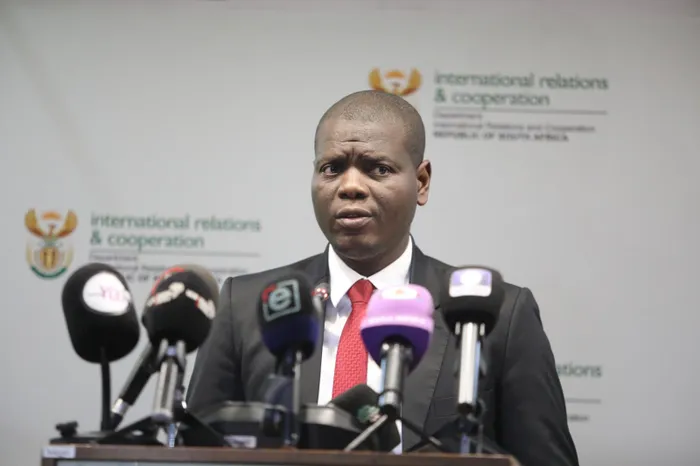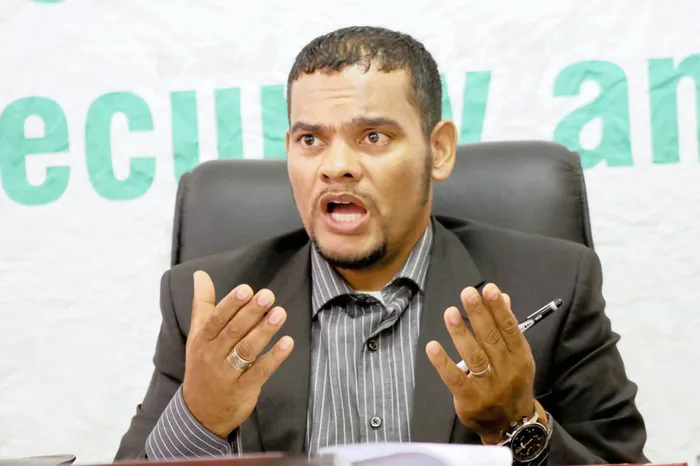
Minister of International Relations and Cooperation Ronald Lamola.
Image: Oupa Mokoena / Independent Newspapers
As South Africa enters the final 100 days of its G20 presidency, the nation stands on the cusp of hosting a historic G20 Summit on African soil for the first time.
The Group of Twenty (G20), an international forum comprising 19 countries, the European Union, and the African Union, is a crucial platform for discussing global economic and financial issues, representing 85% of global GDP and over 75% of international trade.
As the premier forum for international economic cooperation, the G20 plays a crucial role in shaping the global economic agenda.
The summit will gather world leaders to discuss key global challenges and opportunities.
South Africa's presidency, running from December 2024 to November 2025, has been guided by the theme of "Solidarity, Equality, and Sustainability", aiming to prioritise people over profits in global decision-making.
International Relations and Cooperation Minister Ronald Lamola has highlighted the country's commitment.
“South Africa will continue to leverage its diplomatic influence to advance national interests, contribute to regional and continental stability, and build a more just and prosperous world,” he said.
With 87 of the 132 official meetings already concluded, significant progress has been made across both the Sherpa and Finance tracks.
Lamola highlighted key achievements, saying: “Under the Sherpa track, two G20 Working Groups have already successfully adopted G20 Ministerial Declarations (Development Working Group and the Employment Working Group). These outcomes were adopted on July 25, 2025, and July 31, 2025, respectively.”
In the Finance Track, the Fourth G20 Finance and Central Bank Deputies Meeting and the Third G20 Finance Ministers and Central Bank Governors (FMCBG) meeting took place in July in Durban.
“These meetings concluded with a communiqué addressing strategic macroeconomic issues, agreed upon by all members. The South African presidency is now in its most crucial phase, with preparations intensifying for the G20 Leaders’ Summit.
“The negotiations currently under way for the Working Group Ministerial meetings are setting the stage for the forthcoming discussions on the G20 Johannesburg Leaders’ Declaration,” said Lamola.
He said this declaration would be structured around South Africa’s core theme and priorities, with a strong emphasis on the developmental agenda for the Global South and the African continent.
The final negotiations on this declaration will occur at the 4th G20 Sherpa meeting in November 2025, according to Lamola.
He added that several other key meetings were also scheduled, including the G20 Compact with Africa (CwA 2.0) in Johannesburg in early October, a Food Security Meeting in Cairo in September, and a Meeting on Industrialisation and Agriculture in Abuja in October.
“A significant event will be the 2nd G20 Foreign Ministers Meeting on September 25, held at the United Nations Headquarters in New York, on the sidelines of UNGA80… This will mark the second time a G20 Foreign Ministers meeting will be hosted at the UN, with all UN member and observer states invited, following Brazil's initiative last year,” Lamola said.
Lamola emphasised the crucial nature of the upcoming months, stating that they “will be crucial in ensuring a successful Leaders’ Summit where the G20 can commit to collective solutions for shared global challenges”.
One of his deputies at the Department of International Relations and Cooperation, Alvin Botes, highlighted the significance of the G20 presidency, saying that the theme "Solidarity, Equality, and Sustainability" signals South Africa's determination to put people at the centre of global decision-making.

Deputy Minister for International Relations and Cooperation Alvin Botes detailed South Africa's initiatives within the G20 Summit.
Image: Soraya Crowie / Diamond Fields Advertiser
“Our high-level priorities are clear and interlinked. Firstly, inclusive economic growth, industrialisation, employment, and the reduction of inequality. Secondly, food security in an era of climate disruption. Thirdly, harnessing artificial intelligence and broader technological innovation for sustainable development,” Botes said.
He highlighted the pressing global and local challenges, including stubbornly high youth unemployment rates worldwide and in South Africa, where 4.8 million South Africans aged 15–34 are unemployed.
He also pointed to the threat of AI-driven automation rendering entry-level jobs obsolete, compounded by intersecting crises of mental health, climate anxiety, conflict-driven displacement, and the rising cost of living.
Addressing these issues, Botes detailed South Africa's initiatives within the G20.
“In the Employment Working Group, negotiations are under way for a compact on youth employment and skills, building on previous agreements but adding targets for digital-economy apprenticeships and mutual portability of qualifications across G20 members. If adopted, this compact could lead to an estimated 10 million paid internship placements over five years,” he said.
“Under the Finance Track, an 'Innovation & Inclusion Facility' is being advanced, financed through blended public-private instruments, to support start-ups led by women and young people in frontier technologies and green manufacturing. Its initial endowment of US$3 billion aims to create 150,000 sustainable jobs by 2027,” said Botes.
“Furthermore, in the Agriculture Working Group and the Environment and Climate Sustainability Working Group, South Africa is championing a Just Agri-Transition Facility,” Botes said.
He said this initiative links smallholder farmers, including youth, to climate-smart finance and regional value chains, and will underwrite a Pan-African farmers marketplace app.
“Beyond the official meetings, preparations are also under way for the G20 Social Summit, scheduled for November 18-20, 2025. This summit, a key highlight of South Africa’s presidency, aims to expand outreach to communities beyond the G20 Engagement Groups, inviting civil society organisations, think-tanks, and academia from across the world,” Botes said.
mashudu.sadike@inl.co.za
Related Topics: